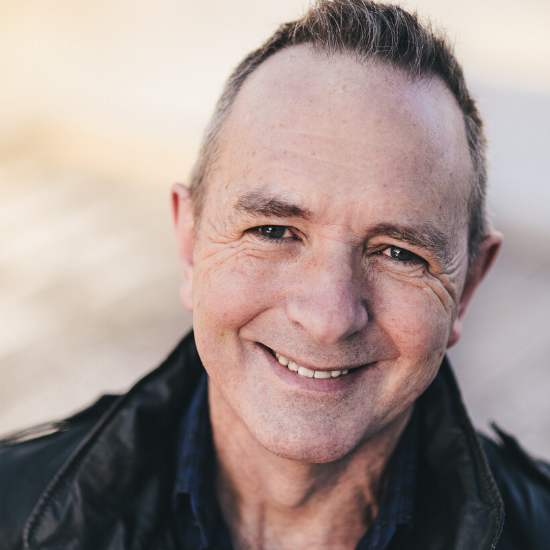
Interview with our new jury member Martin Wright
The startup that's going to be the 2020 Green Alley Award winner will have to pitch live on stage in Berlin and convince our seven jury members. Today, we would like to introduce you to Martin Wright, Chair of Positive News, our new partner. Positive News is a UK based media platform about the good things that are happening. It is the first media organisation in the world that is dedicated to quality, independent reporting about what’s going right. As Martin is a a highly experienced speaker himself, writer and adviser on sustainability and positive futures, he has great advice for those lucky six finalists.
# What is your personal motivation to engage in the circular economy?
Partly survival – of our species, and others: we can’t continue sucking up finite resources and spewing out waste and expect to have an environment in which we can thrive. We are running out of resources, and running out of ways to dispose of waste which doesn’t cause problems. You can’t throw stuff ‘away’, because there is no ‘away’. The climate emergency is merely the most dramatic example of the impact of an excessively linear, take-make-waste economy. (We take fossil fuels out of the ground, make energy with them, and puff out the waste into the atmosphere, where it warms the planet to an uncomfortable degree.)
And partly because it’s natural: Nature herself is a circular economy in action; nothing goes to waste. Plants flourish, fade and die, and become compost and food for other creatures.
And… it’s how I was brought up. As a child, most of what we owned was second-hand; I wore clothes handed down from older siblings and cousins. My Mum mended stuff until it wore thin, and then used it as cleaning cloths before finally putting the rags in the compost. That was just how we did things. Our take-make-waste consumer frenzy model is (I hope!) a recent, temporary aberration. Circular is Normal!
# You have been advising several organizations and companies on sustainability topics. What role do politics and companies play in promoting a circular economy?
Politics: We can encourage a more circular economy by a mix of regulation and fiscal incentives. Reframing the latter so we tax what we don’t want (pollution), not what we do (jobs), would be a start. In an ideal world, we’d put a price on carbon in line with science-based targets to keep global warming to under 1.5 degrees.
Politics also has a role to play in ensuring that our pursuit of a renewable economy is carried out in as circular a way as possible. We need to avoid unintended consequences, such as trashing communities and habitats in pursuit of the raw materials needed for green energy.
Companies: Companies should do what they do best – pursue the business opportunities which lie in the circular economy, and lobby governments for regulations which encourage them to do so, by penalizing wasteful business models.
# Being a successful speaker yourself do you have any hands-on advice for our finalists pitching their ideas live on stage?
Enthuse! You’re excited about your idea (I hope you are anyway!), so get that excitement across to the judges and the audience.
Be yourself: don’t pretend to be someone you’re not; don’t try to squash yourself into some idea of what a successful pitcher looks or sounds like. You’ll come over best if you’re natural.
It’s fine to be a bit nervous: it can actually be quite disarming. Stay calm, speak clearly, remember to breathe J.
Don’t try to blind the judges with too much business jargon or tech talk – we’ve heard it all before.
And don’t over-hype. No-one expects your invention to crack climate change / feed the world / save the polar bears all by itself, so don’t exaggerate its impact beyond the point of credibility.
Just give us the essentials: what’s the problem this solves; how does it work; what will it result in. And be sure you’re on firm ground when it comes to any questions about cost / affordability, etc.
Practice your pitch – particularly keeping it to time - and then relax. Don’t over-rehearse to the point where you come over as an automaton.
Take a deep breath – make eye contact – and smile. And you’re away!
# In your opinion which role does our digital age play in promoting the circular economy and the sustainable use of our resources?
A massive potential for good, but not without challenges.
AI could hugely increase our energy and resource productivity, and automation in general enable much more effective re-use and re-purposing – but we need to make sure that humans don’t suffer as a result of a rushed and unjust transition sending millions into redundancy.
Get it right, though, and AI could power a fourth industrial revolution (4IR). To give just one example: it could result in a world in which power supplies are increasingly generated and managed at the micro-level, with a mix of solar, wind and other renewables combined with sophisticated energy storage. Thanks to the combination of 4IR technologies, these can combine in a system where tiny amounts of power are forever moving to and fro, keeping the overall grid in balance, and making sure electricity is being used optimally, reducing consumption while ensuring the right amount of energy is available exactly where and when needed. The millions of financial transactions involved would be managed smoothly thanks to secure blockchain connections and the internet of things. In turn, this would make viable a whole range of energy innovations, such as ‘solar sprays’ to turn every exterior surface of a building into a power plant.
Plenty more ideas where that came from…